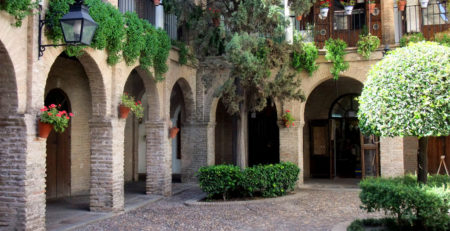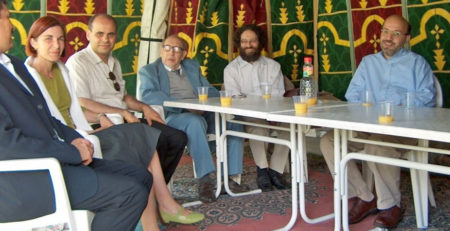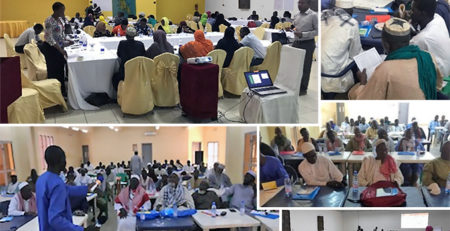The Cordoba Update 02-15.06.2015

1) LIBYA
» 08.06.2015: Leon’s Political Agreement Draft meets Cautious Hope in Tripoli and Tobruk
A fourth round of Libyan political dialogue took place in Morocco on 8 June under the auspices of UNSMIL. Bernardino Leon presented the National General Congress (GNC, Tripoli) and House of Representatives (HoR, Tobruk) a fourth draft of UNMSIL’s proposed political agreement to both parties to the conflict. Structured into eight sections the draft agreement proposes the creation of a government of national accord; a legislative authority embodied by the HoR; a high council of the state consisting of 90 members of the GNC, and 30 others representing traditional, national, and civil society figures. The draft document accounts also for confidence building measures; security arrangements; and a constitutional process. While the GNC said that the fourth draft had introduced positive elements and that the Congress would announce its position after consultation, the HoR rejected Leon’s draft altogether and order its delegation to return to Tobruk. The HoR, although empowered in the draft as the only legislative authority (while the GNC was given a consultative status only in the proposed high council of state) considered that the GNC is being kept alive while it was in fact illegal. The HoR also rejects Article 36, section 3, which stipulates that the Government of National Accord shall commit itself to establish and activate the security institutions at the top of which is the army and police.” For the HoR there is already a Libyan army under the command of Khalifa Hafter and that there is no need to re-establish a new army. The position of the HoR is, not a united one, however. While the dialogue delegations were meeting the G7 in Berlin Mahmoud Jibril called, from Brussels, on the HoR to reconsider its position and “try to pin point what is acceptable and not acceptable according to certain criteria” in Leon’s proposal. Division continue to undermine the HoR and its transition government on one hand and Hafter on the other hand. Hafter sacked Faraj Barasi, his army commander for the second time, which angered the Barasi tribe. The Tripoli camp is not that unified as well. Key members of the GNC’s delegation, such as Salah Bekouche, that participated in all first three rounds of dialogue resigned before the fourth round convened, and were replaced. Those who resigned criticised Leon’s allegedly lack of impartiality.
Links for more information :
http://unsmil.unmissions.org/LinkClick.aspx?fileticket=pvy_G4Fzt4c%3d&tabid=3543&mid=6187
http://www.kuna.net.kw/ArticleDetails.aspx?id=2446549&Language=en
http://www.libyaherald.com/2015/06/15/wary-hor-refers-dialogue-draft-no-4-to-committee-to-evaluate
http://www.libyaherald.com/2015/06/15/hafter-sacks-faraj-barasi-as-second-time
https://www.youtube.com/watch?v=DXT4MKPQNNY
2) TUNISIA
» 10.06.2015: Amnesty instead of Transitional Justice to Boost Economy?
In the midst of the string of strikes, sit in and social unrest Tunisia has been experiencing in the last several weeks, a Tunisian court rejected a decree, passed in 2011 under Mouncef Merzouki, that confiscated the properties and assets of former president Ben Ali and 114 businessmen. Moreover, the court ruled in favor of compensation for Ben Ali and the businessmen. The court based its decision on a procedural error in that the decree was not validated by the Constituent Assembly at the time. The decision, which can be appealed against, triggered a national debate on transitional justice and national reconciliation. While some consider it another blow to the achievements of the 2011 uprising, the businessmen community and political parties close to it welcomed the court’s decision as necessary to jump-start the Tunisian economy, and boost investment in a comprehensive national reconciliation process. President Caid Essebsi seized the opportunity to call for his national reconciliation consensus initiative (announced in last March but overshadowed by the Bardo Museum attack) in order to find a solution to transitional justice issues outside the courts. The political elite and media took note of Essebsi’s intentions in this regard when he made no mention of transitional justice in his inaugural presidential speech, and only focused on national reconciliation. The government is not necessarily in agreement with Caid Essebsi and the business community. At a conference entitled “In order to save transitional justice”, Mohamed Salah Ben Aissa, ministre of Justice, made his opinion clear that he is not in favor of an amnesty for all. During a tour in the south of the country to appease social tensions Rached Ghanouchi announced last week,” it is true we did not set up the revolution’s gallows nor did we exclude or took revenge from our opponents. We called for national reconciliation including businessmen; but this does not mean that we are in favor of the court’s decision rejecting the confiscation decree, which is one of the fruits of the revolution … we will not allow anyone to belittle the revolution and we won’t allow a return of the former regime which we shall confront.”
Links for more information:
http://www.alaraby.co.uk/english/politics/2015/6/15/tunisian-court-orders-ben-ali-assets-to-be-returned
http://kapitalis.com/tunisie/2015/06/10/reconciliation-nationale-ben-aissa-en-desaccord-avec-caid-essebsi/
http://www.alaraby.co.uk/politics/2015/6/14/
3) EGYPTE
» 10.06.2015 : Le Cairo Institute for Human Rights Studies (CIHRS) Mis à l’Enquête
L’Institut du Caire pour les études des droits de l’homme serait soumis à une enquête menée par le Ministère de la Solidarité sociale pour contrôler ses fonds étrangers. Selon le communiqué dénonçant cette enquête, cette investigation serait une réponse à un discours adressé par le directeur du CIHRS, Bahey al-Din Hassan, au Comité des droits de l’homme du Parlement européen le 28 mai dernier, dans lequel il critique les violations des droits de l’homme perpétrées par le gouvernement actuel.
Les organisations de la société civile ainsi que les associations défendant les droits de l’homme dénoncent les pratiques d’intimidation dont elles font l’objet. Mardi 9 juin, répondant à un rapport relatif aux violations des droits de l’homme commises sous le gouvernement d’Abdel Fattah al-Sissi au cours de sa première année de présidence, le Ministère égyptien des Affaires étrangères a dénoncé Human Rights Watch pour prétendument “propager des mensonges” et “soutenir le terrorisme.”
Lien(s) pour plus d’information :
http://www.cihrs.org/?p=15159&lang=en
http://www.madamasr.com/news/authorities-probe-rights-organization-cihrs
http://www.defenddefenders.org/2015/06/egypt-cease-administrative-harassment
» 16.05.2015 : Rapports Sunnites-Chiites
Un groupe de chercheurs « islamistes experts en chiisme » a lancé le 16 mai dernier le Centre des Imams pour la lutte contre l’expansion chiite. Selon les chercheurs, il s’agira de suivre l’état du chiisme non seulement en Egypte, mais aussi dans tout le monde arabe et musulman pour révéler les dangers que cela impliquerait pour le monde sunnite. Le directeur du Centre, Mohamed Saber, ajoute que le but sera d’identifier les cellules cachées loyales à l’Iran.
Abdel-Moneim Foud, professeur à l’Université Al-Azhar, pense, quant à lui, que le chiisme n’est pas une branche de l’islam et qu’ainsi les chiites ne doivent pas avoir le droit de pratiquer leurs rituels librement. C’est pourquoi, continue-t-il, l’Université Al-Azhar ne leur permet pas de pratiquer leurs rituels publiquement ni de construire leurs propres mosquées. Cependant, il insiste que ce n’est pas contre les chiites eux-mêmes, mais contre leur religion qui est trop proche de la politique.
Les médias égyptiens accusent souvent les chiites d’être des agents à la solde de l’Iran.
Lien(s) pour plus d’information :
http://burathanews.com/news/266746.html
http://www.al-monitor.com/pulse/originals/2015/05/egypt-shiites-sufis-religion-minority-discrimination.html
http://www.aljazeera.com/news/2015/06/egypt-jails-23-men-shia-killing-150613165403189.html
» 05.06.2015 : Reforme d’Al-Azhar
Le 27 mai, Abdel Fattah al-Sissi a reçu le Cheikh Ahmed el-Tayeb, Grand Imam de Al-Azhar, pour discuter des efforts de l’institution pour contrer l’extrémisme.
En janvier dernier, Abdel Fattah al-Sissi a annoncé qu’il avait l’intention de réformer l’Université Al-Azhar, la plus ancienne université islamique encore en fonction, dans sa campagne pour l’établissement d’un nouveau discours religieux loin de tout extrémisme. En effet, l’institution se trouve au milieu d’une polémique entre les laïcs qui blâment ses cheikhs pour le discours religieux qu’ils véhiculent et les cheikhs qui reprochent aux laïcs de dépouiller l’Egypte de son identité islamique.
Selon le chercheur Islam al-Buhairi, demander à Al-Azhar de réformer la rhétorique religieuse est absurde, car Al-Azhar serait elle-même l’unique obstacle à toute réforme.
Lien(s) pour plus d’information :
http://www.al-monitor.com/pulse/originals/2015/05/egypt-salafist-sufi-religion-extremism-azhar-quran-sheikh
http://www.al-monitor.com/pulse/originals/2015/06/egypt-azhar-university-curriculum-updates-extremist-sisi
4) YEMEN
» 15.06.2015: Geneva Peace Talks About Yemen Started
Following a conflict that had killed more than 2000 people so far, about of half of whom were civilians, the UN succeeded finally to sponsor consultations on the Yemen crisis, which have started in Geneva, on Monday 15th. The talks aim to end the country’s bloody conflict. After several international and regional attempts to organize inclusive talks gathering all Yemen’s political actors, UN secretary-general, Ban Ki-Moon, called on all sides to implement a new humanitarian truce at the start of the holy fasting month of Ramadhan. Separate pre-talks were organised before the start of the inclusive talks, between the official government delegation and the delegations of the Houthis and former president Ali Abdullah Saleh’s General People’s Congress.
Links for more information:
http://www.aljazeera.com/news/2015/06/sponsored-yemen-peace-talks-open-geneva
http://www.aljazeera.net/programs/newsreports/2015/6/14/
http://www.aljazeera.net/knowledgegate/opinions/2015/6/11/
5) SAHEL
Mali
» 10.06.2015 : Rôle et Mission de la MINUSMA au Mali: les Leaders Religieux s’Expriment
Le Haut conseil islamique du Mali, en partenariat avec la MINUSMA a organisé les 9 et 10 juin dernier un atelier d’échange sur le rôle de la MINUSMA. Cela a été l’occasion d’aborder plusieurs thématiques concernant la paix et la sécurité au Mali, notamment le rôle et la place des leaders religieux musulmans dans le maintien et le retour de la paix et de la quiétude sociale dans le pays.
Dans son discours, le représentant de la MINUSMA a informé qu’à la fin de ce mois, le renouvellement du mandat de la MINUSMA serait en discussion à l’ONU et qu’il voyait ainsi en ces deux jours de débats et d’échanges l’occasion pour les uns et les autres de comprendre le rôle et la mission de la MINUSMA. Quant au chef de l’Etat, Ibrahim Boubacar Kéita, il a félicité les leaders religieux pour le rôle qu’ils jouent pour le retour de la paix au Mali.
Lien(s) pour plus d’information :
http://maliactu.net/mali-role-et-mission-de-la-minusma-au-mali
» 05.06.2015 : LA CMA s’Engage à Signé l’Accord de Paix le 20 Juin 2015
Les discussions tenues du 29 mai au 5 juin dernier à Alger ont abouti à l’adoption de deux documents, qui tiendraient compte, en partie, des préoccupations exposées par la Coordination des Mouvements de l’Azawad à la médiation internationale le 17 mars 2015. Ainsi la CMA s’est engagée à signer l’accord de paix le 20 juin 2015.
L’un des documents, portant sur l’arrangement sécuritaire pour une cessation des hostilités, ne fait cependant pas l’unanimité. La population de Ménaka a notamment annoncé que les groupes armés de la plateforme ne quitteraient pas la ville tant que l’armée malienne ne contrôlerait pas Kidal.
Lien(s) pour plus d’information :
http://mnlamov.net/actualites/448-decision-de-proceder-a-la-signature-de-l-accord-le-20-juin-2015.html
http://www.studiotamani.org/index.php/politique/4175-nord-en-attente-de-la-signature-de-l-accord-le-20-juin-par-la-cma
http://www.studiotamani.org/index.php/politique/4136-discussions-d-alger
http://www.studiotamani.org/index.php/politique/4160-menaka-la-population-hostile-au-retrait-de-la-plate-forme
http://www.studiotamani.org/index.php/politique/4173-menaka-une-delegation-de-la-minusma-rencontre-les-manifestants
Tchad
» 15.06.2015 Attentat à N’djaména Attribué à Boko Haram
La capitale tchadienne N’Djamena a été frappée le 15 juin pour la première fois par un double attentat-suicide qui a fait 27 morts et 101 blessés selon les dernières estimations. Cette attaque a été attribuée par le gouvernement à Boko Haram. En janvier dernier, le chef de Boko Haram, Abubakar Shekau, avait déjà défié dans une vidéo les présidents camerounais, nigérien et tchadien. Le 13 février 2015, le groupe armé avait lancé un premier raid en territoire tchadien contre la localité de Ngouboua. Les deux attaques perpétrées ce lundi ont visé le commissariat central de N’Djamena et l’école de police. Tout en condamnant l’attentat commis par Boko Haram, la Convention Tchadienne pour la Défense des Droits de l’Homme (C.T.D.D.H) s’inquiète des répercussions que les mesures sécuritaires pourraient avoir sur le respect des libertés fondamentales et la stigmatisation d’une partie de la population (les tchadiens d’origines nigérianes, haoussa et Bornou kanouri).
Suite à la rencontre d’Abuja qui s’est tenue le 11 juin et a réuni les présidents des autres pays de la Force multinationale opérationnelle interarmées (MNJTF) – le Cameroun, le Tchad, le Niger et le Bénin -, Muhammadu Buhari, le nouveau président nigérian, a affiché sa volonté de reprendre en main la lutte engagée dans la région contre les islamistes de Boko Haram. Buhari s’est fermement opposé à l’idée d’un commandement tournant de la force tous les six mois entre les cinq pays contributeurs de troupes. L’idée d’un commandement rotatif était soutenue par le Tchad qui a été à l’initiative des principales opérations militaires contre Boko Haram dans la région du Lac Tchad. Les cinq Etats se sont engagés à déployer leurs soldats avant le 30 juillet 2015. La force sera comme prévu sous le commandement d’un haut gradé nigérian, le major général Buratai. Le commandant adjoint sera un Camerounais, puis changera au bout d’un an. Quant au chef d’état-major, il reviendra à un Tchadien. Là aussi, une rotation aura lieu au bout de douze mois.
Lien pour plus d’information :
http://makaila.over-blog.com/2015/06/tchad-la-ctddh-redoute-des-violations-des-droits-humains-apres-les-attentats
http://makaila.over-blog.com/2015/06/tchad-le-mcct-craint-que-le-regime-deby-prenne-ces-attentats-comme-pretexte
http://www.tchadactuel.com/?p=12575
The views and perspectives contained in the Weekly Update are from individual contributors and external sources, and do not necessarily reflect the opinions or position of the Cordoba Foundation of Geneva. The links are neither intended as an endorsement of particular publications nor the only source for the updates, but to connect to information in the public domain, for those interested in background or further details.











